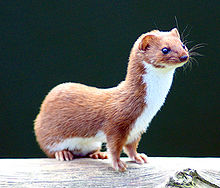- Weasel
-
Weasel 
Least Weasel Scientific classification Kingdom: Animalia Phylum: Chordata Class: Mammalia Order: Carnivora Suborder: Caniformia Family: Mustelidae Subfamily: Mustelinae Genus: Mustela
Linnaeus, 1758Species Weasel

Mustela range Weasels (
 /ˈwiːzəl/) are mammals forming the genus Mustela of the Mustelidae family. They are small, active predators, long and slender with short legs.
/ˈwiːzəl/) are mammals forming the genus Mustela of the Mustelidae family. They are small, active predators, long and slender with short legs.Weasels vary in length from 12 to 45 centimetres (5 to 18 in), and usually have a red or brown upper coat and a white belly; some populations of some species moult to a wholly white coat in winter. They have long slender bodies, which enable them to follow their prey into burrows. Their tails may be from 22 to 33 centimetres (9 to 13 in) long. Weasels have a reputation for cleverness and guile.
Weasels feed on small mammals, and have from time to time been considered vermin since some species took poultry from farms, or rabbits from commercial warrens. Weasels occur all across the world except for Antarctica, Australia, and neighbouring islands.
Contents
Terminology
The English word "weasel" was originally applied to one species of the genus, the European form of the Least Weasel (Mustela nivalis). This usage is retained in British English, where the name is also extended to cover several other small species of the genus. It is thought that the name "weasel" comes from the Anglo-Saxon root "weatsop" meaning "a vicious bloodthirsty animal". However, in technical discourse and in American usage the term "weasel" can refer to any member of the genus, or to the genus as a whole. Of the 17 extant species currently classified in the genus Mustela, ten have "weasel" in their common name. Among those that do not are the stoat or ermine, the polecats, the ferret, and the European Mink (the superficially similar American Mink is now regarded as belonging in another genus, Neovison).
Collective nouns for a group of weasels include boogle, gang, pack, sneak and confusion.[1][2][3]
Species
The following information is according to the Integrated Taxonomic Information System.
Mustela africana Desmarest, 1800 Tropical weasel South America Mustela altaica Pallas, 1811 Mountain weasel Europe & Northern Asia
Southern AsiaMustela erminea Linnaeus, 1758 Stoat
Ermine
Short-tailed weaselEurope & Northern Asia
North America
Southern Asia (non-native)
New Zealand (non-native)Mustela eversmannii Lesson, 1827 Steppe polecat Europe & Northern Asia
Southern AsiaMustela felipei Izor and de la Torre, 1978 Colombian weasel South America Mustela frenata Lichtenstein, 1831 Long-tailed weasel Middle America
North America
South AmericaMustela itatsi Temminck, 1844 Japanese weasel Japan & Sakhalin Is. (Russia) Mustela kathiah Hodgson, 1835 Yellow-bellied weasel Southern Asia Mustela lutreola (Linnaeus, 1761) European mink Europe & Northern Asia Mustela lutreolina Robinson and Thomas, 1917 Indonesian mountain weasel Southern Asia Mustela nigripes (Audubon and Bachman, 1851) Black-footed ferret North America Mustela nivalis Linnaeus, 1766 Least weasel Europe & Northern Asia
North America
Southern Asia (non-native)
New Zealand (non-native)Mustela nudipes Desmarest, 1822 Malayan weasel Southern Asia Mustela putorius Linnaeus, 1758 European polecat
Domesticated Ferret (ssp. furo)Europe & Northern Asia
New Zealand (ssp. furo) (non-native)Mustela sibirica Pallas, 1773 Siberian weasel Europe & Northern Asia
Southern AsiaMustela strigidorsa Gray, 1855 Back-striped weasel Southern Asia Mustela subpalmata Hemprich and Ehrenberg, 1833 Egyptian weasel Egypt 1 Europe & Northern Asia division excludes China.
The extinct "Sea mink" was commonly included in this genus as Mustela macrodon, but in 1999 was moved to the genus Neovison.[4]
Weasels in popular culture
Weasels are often the subject of the children's song and nursery rhyme, "Pop Goes the Weasel." Also, a weasel named Dunglap (voiced by John Kassir) is one of the title characters' best friends in CatDog.
In Brian Jacques' "Redwall" series, weasels are depicted as evil and greedy. They are often the enemy and antagonists in the stories.
Weasels, ferrets and stoats were the enemies of Toad of Toad Hall in the popular children's classic The Wind in the Willows.
The weasel is said to be the patronus charm of book and movie character Arthur Weasley in JK Rowling's series "Harry Potter".
In Who framed Roger Rabbit Judge Doom has cartoon weasels as henchmen
Footnotes
- ^ Bertrand, John. A Gulp of Cormorants???. The Bosque Watch. Volume 14, Number 2, April 2007. Retrieved on 2007-07-24.
- ^ Fun with Words: Collective Nouns [1] Retrieved on 2010-04-26.
- ^ The Collective Nouns [2] Retrieved on 2010-04-26.
- ^ IUCN Red List of Threatened Species
References
- "Mustela". Integrated Taxonomic Information System. http://www.itis.gov/servlet/SingleRpt/SingleRpt?search_topic=TSN&search_value=180552. Retrieved 24 July 2007.
- Nowak, Ronald M., and Ernest P. Walker. Walker's Carnivores of the World. Baltimore: Johns Hopkins University Press, 2005. ISBN 0801880335, ISBN 0801880327.
- C. Hart Merriam, Synopsis of the Weasels of North America, Washington, Government Printing Office, 1896.
External links
Categories:- Weasels
- Fauna of Southeast Asia
- Mammals of Asia
- Mammals of Europe
- Mammals of North America
- Mustelinae
Wikimedia Foundation. 2010.
